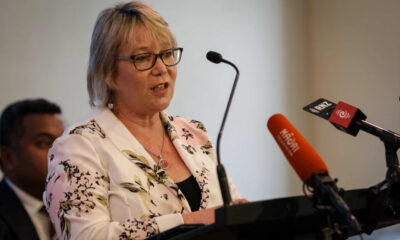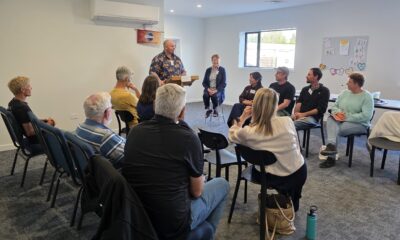Health
Urgent Funding Needed to Sustain Dementia Services in Queenstown-Lakes

The future of dementia support services in the Queenstown-Lakes District is at risk as funding from the Mactodd Community Charitable Trust comes to an end. According to Antoinette McLean, manager of Alzheimers Otago, the organization urgently needs new funding partners to maintain its services, which currently receive only a quarter of their funding from government contracts.
Critical Services at Stake
Without additional financial support, Alzheimers Otago may have to reduce essential services such as dementia navigation support and group programs in Queenstown and Wanaka. McLean emphasized that the six years of start-up funding from the charitable trust allowed the organization to establish crucial support services, but it was never meant to be a permanent solution.
The Queenstown-Lakes District is home to an estimated 500 people living with dementia. Alzheimers Otago currently supports 216 of these individuals. Projections indicate that by 2050, this number could increase to about 630, further highlighting the pressing need for sustainable funding solutions.
McLean called upon local businesses, philanthropists, and the community to step forward and help maintain these vital services. “If you’ve ever thought about making a difference locally, this is the moment,” she stated.
Personal Impact on Families
The potential cutbacks have drawn concern from families affected by dementia. Andrew Millar, a retired resident of Wanaka, shared his fears about the implications for his wife, Sue Wallace, who has Alzheimer’s disease. He described the support provided by Alzheimers Otago as a “vital lifeline” that enhances the quality of life for both patients and their caregivers.
“Life would be a lot more difficult,” Millar said, reflecting on the benefits of programs like the Aspiring Wanderers dementia day club. He emphasized that such initiatives not only foster social interaction but also provide cognitive stimulation, which is crucial for those living with dementia.
Millar noted that the support services help combat loneliness for caregivers as well, stating that they are fortunate to have a range of activities and a caring community in Wanaka. The disappearance of these services would lead to a “gloomy existence” for families like his, he warned.
The Aged Care Association has also urged the government to provide temporary funding for Alzheimers Otago. Chief executive Tracey Martin highlighted the potential wider costs associated with losing dementia support services, including increased pressures on hospitals and emergency services. She argued that the financial requirements for maintaining these services are modest compared to the long-term benefits they provide.
As discussions continue regarding the redesign of the aged-care funding model, Martin urged the government to continue backing organizations like Alzheimers Otago. The need for immediate action is clear, and the survival of these essential support services hangs in the balance.
-

 Sports2 months ago
Sports2 months agoNetball New Zealand Stands Down Dame Noeline Taurua for Series
-

 Entertainment2 months ago
Entertainment2 months agoTributes Pour In for Lachlan Rofe, Reality Star, Dead at 47
-

 Entertainment1 month ago
Entertainment1 month agoNew ‘Maverick’ Chaser Joins Beat the Chasers Season Finale
-

 Sports2 weeks ago
Sports2 weeks agoEli Katoa Rushed to Hospital After Sideline Incident During Match
-

 Sports2 months ago
Sports2 months agoSilver Ferns Legend Laura Langman Criticizes Team’s Attitude
-

 Politics1 month ago
Politics1 month agoNetball NZ Calls for Respect Amid Dame Taurua’s Standoff
-

 Entertainment3 months ago
Entertainment3 months agoKhloe Kardashian Embraces Innovative Stem Cell Therapy in Mexico
-

 Sports2 weeks ago
Sports2 weeks agoJamie Melham Triumphs Over Husband Ben in Melbourne Cup Victory
-

 World4 months ago
World4 months agoPolice Arrest Multiple Individuals During Funeral for Zain Taikato-Fox
-

 Sports3 months ago
Sports3 months agoGaël Monfils Set to Defend ASB Classic Title in January 2026
-

 Entertainment2 months ago
Entertainment2 months agoTyson Fury’s Daughter Venezuela Gets Engaged at Birthday Bash
-

 Sports2 months ago
Sports2 months agoHeather McMahan Steps Down as Ryder Cup Host After Controversy





















